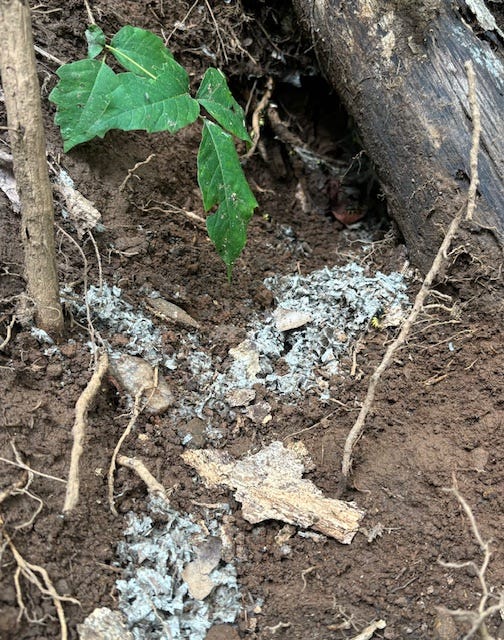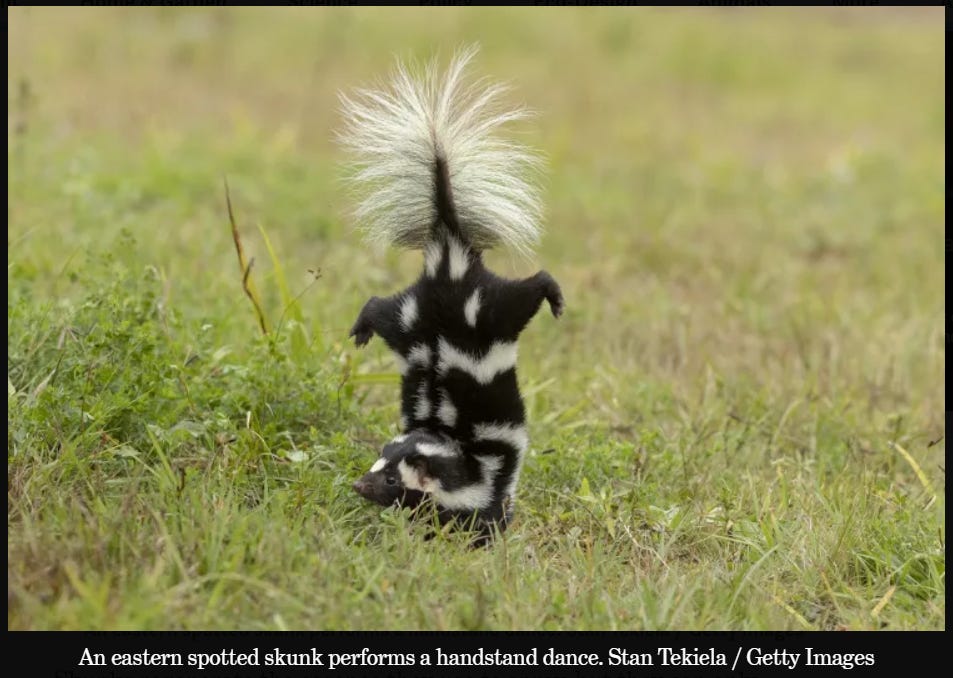I recently hiked with a friend whose dog had an encounter with a skunk – four weeks later, the dog still had a slight skunky odor. It reminded me of the night I awoke to the horrible sound of a dog screaming, and when I sat straight up in bed I was walloped by the rancid smell of a freshly sprayed skunk. It was enough to make my eyes water.
My first thought was that my dog had been sprayed, so I rushed to the back porch1 to find him sleepily peering out of his dog house, confused about the ear-piercing shrieks coming from the neighbor’s dogs. I quickly let him inside, only to wonder about the whereabouts of our cat.
That’s when I heard scratching at the carport kitchen door. Thank goodness! The cat must be freaked out by the commotion. Fortunately, I took a look out the window before I opened the door because –--
the skunk was just on the other side, scratching at our door and attempting to escape from the howling dogs.
The neighbor’s dogs weren’t chasing the skunk – they were temporarily blind and extremely demotivated. They were nowhere near the skunk. But the skunk had enough and just wanted to get away, and inside my house apparently seemed like a good place.
Thankfully, I did not let a skunk inside my house that night. But my memory of the incredibly nauseating smell made me wonder…
How do skunks even deal with their own odor?
My friend’s dog is young and reportedly wanted to play with the black and white kitty he found. He was extremely surprised to be sprayed directly in the snout and eyes by his playmate, an event that surely affected his ability to smell anything other than skunk for the next few weeks.
For our readers from the Eastern Hemisphere, skunks are small mammals (about the size of a housecat) that had been thought to belong to the weasel family, though now they have a classification all their own (Mephitidae, originating from the Latin for “bad odor”). They only live in North and South America and are related to stink badgers, which live in Indonesia and the Philippines.
Skunks spray when they feel threatened, but will try to avoid spraying since it takes a week to 10 days to regenerate their musk, so when threatened they’ll oftentimes hiss and bare their teeth and even do a handstand dance to try to scare off the threat.
Skunk spray smells bad because it is made up of thiols, compounds that contain sulphur, the element that makes rotten eggs smell. Skunk spray contains three different thiols, meaning it’s especially noxious. Just like snakes that can adjust the amount of venom they inject, skunks can regulate their musk and even use just one of the two glands they have available. They usually aim for the eyes in order to blind their attackers and can choose to release a targeted spray or a broader mist. The North American skunks around us can spray accurately up to 10 feet (3 meters) away and with less accuracy to 20 feet (6 meters).
Skunks are omnivores. They eat berries, nuts, leaves, roots, mushrooms, and small lizards, snakes, and worms, but they’re especially known for digging up underground yellowjacket nests to eat the grubs – just like armadillos. This is a redeeming quality that makes me slightly more accepting of their being in my yard, just not when my dog is around.
They’re also excellent at catching mice – so much so that Native Americans kept them as pets to protect their food stores from rodents like we now keep barn cats. Wouldn’t that be a really smelly alternative to perhaps taming a bobcat instead? Turns out the Native Americans were the first to perfect removing the scent glands from baby skunks.
Skunk oil, made from skunk fatty tissue, was used by Native Americans to treat poison ivy and coughs (it was spread as a liniment like Vick’s Vaporub). I can see that clearing a cough right up.

So, if skunks are so good at finding wasp nests and mice, wouldn’t they have to have a good sense of smell?
Yes! Skunks actually have a keen sense of smell – better than humans (and humans can actually smell a skunk from one mile away). Skunks have poor vision, however, which is why you so often see them dead on the side of the road – they can’t see oncoming traffic well at all.
How do they deal with their own smell? Researchers assume that skunks just get used to their own scent and are able to “block” it out in order to smell other animals and food sources. However, skunks do get sprayed by other skunks during the spring mating season when males may argue over available mates. They appear to enjoy being sprayed about as much as we do – observers have watched sprayed skunks wipe their nose with their paws or roll in the grass and dirt to try to remove the musk – not because it smells, but because the spray is an irritant and uncomfortable for the eyes and soft tissue areas.
Interestingly, not everyone is bothered by the smell of skunks. About 1 in 1,000 people have a condition that makes them unable to smell skunk spray. And the Carnivora family, which includes dogs and also lions, bears, tigers and others, don’t appear to be bothered by the smell of skunks in the same way most people are. They don’t find it “disgusting,” but then neither are they repelled by the smell of roadkill or animal feces, so that seems about right.
There’s an old wives’ tale that if your dog gets sprayed by a skunk, tomato juice will help remove the smell. That, unfortunately, turns out not to be true. It’s not strong enough to break down the thiols in the skunk spray. However, a solution of 1 quart of hydrogen peroxide, a quarter cup of baking soda and 2 teaspoons of liquid dishwashing soap should be effective according to this article. It’s important to note that you should NOT get this in your dog’s eyes and you can’t store any unused portions because it can be explosive!
So, it seems like skunks are perfectly fine wandering the forest in their sulphur-smelling cloud of musk. It doesn’t affect their ability to find food, but it also doesn’t dissuade their primary predator – owls – since owls have little to no sense of smell. All the other animals – including dogs – leave skunks alone, at least after they’ve been sprayed once.
Weird Nature:
Click to watch:
This was years ago, before I knew dogs are supposed to sleep inside with their people










There's a resident skunk in our neighborhood which abuts a forested hillside. The neighborhood also hosts a number of dogs, some of whom have had encounters I'm sure. The air is occasionally redolent of those dust-ups. Now that I've read this article, I'm going to be very much more cautious in my semi-wild backyard!
Yikes, I hope I never meet a skunk. But fascinating. My dog would try to herd one if she met it, I suspect.